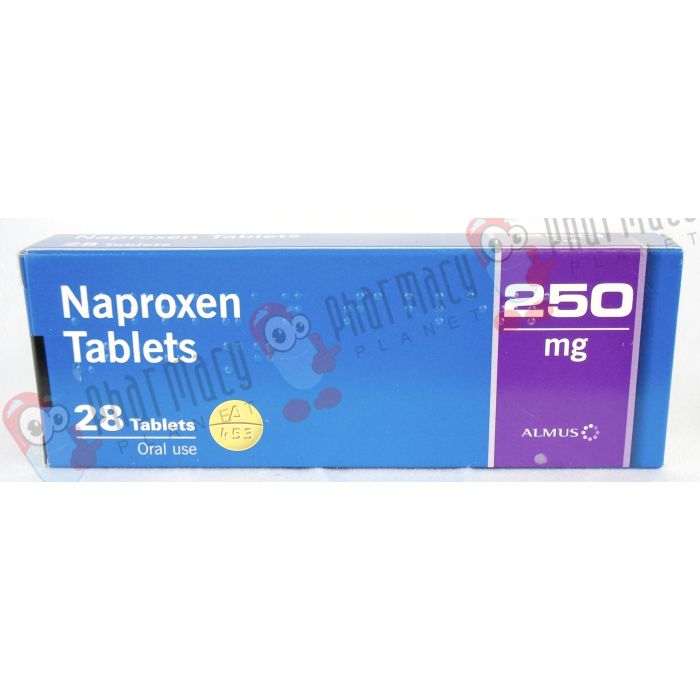Exactly follow your doctor's Naproxen administration instructions. Ask your doctor or pharmacist if you have doubts.
Rheumatoid arthritis, osteoarthritis, and ankylosing spondylitis: The usual starting dose is one to two tablets (500-1000 mg of naproxen) twice a day (morning and night). In patients with severe night pain and/or morning numbness, patients who go from another antirheumatic treatment to Naproxen and in osteoarthritis with pain as the predominant symptom, it is recommended to start therapy with doses of one and a half tablets to two tablets (750- 1000 mg) daily for several weeks. As for maintenance therapy, a single daily dose of one to two tablets (500-1000 mg) can be administered in the morning or evening.
Acute gout: An initial dose of one and a half tablets (750 mg) is recommended, followed after 8 hours by one tablet (500 mg), and then continue with half a tablet (250 mg) every 8 hours until the attack subsides.
Dysmenorrhea: The recommended starting dose is one tablet (500 mg) followed by half a tablet (250 mg) every 6 to 8 hours.
Acute musculoskeletal processes: The recommended starting dose is one tablet (500 mg) followed by half a tablet (250 mg) every 6 to 8 hours.
In acute crises and as long as there is no history of gastrointestinal disease, the dose can be increased to three tablets (1500 mg), for no more than 2 weeks.
Pediatric patients: In juvenile rheumatoid arthritis, a dose of 10 mg/kg/day is recommended, divided into two doses, at 12-hour intervals.
Special dosage: In the elderly or in patients with heart, liver, or kidney disorders, the dose should be reduced.
Naproxen is administered orally. Swallow the tablets with a sufficient amount of liquid, a glass of water, or another liquid. It is advisable to take the product during meals.
Like all medicines, this medicine can cause side effects, although not everybody gets them.
The side effects that may occur during treatment with this medicine, and which have been observed with a very rare frequency (in less than 1 in 10,000 patients) are:
Gastrointestinal disorders:
The most frequent adverse effects that occur with medications such as naproxen sodium are gastrointestinal (affects the stomach and intestine): inflammation, peptic ulcers, gastrointestinal bleeding, perforations (in some cases fatal), especially in the elderly population, and obstruction. Dyspepsia (digestion disorders), nausea, vomiting, diarrhea, flatulence (gas), constipation, heartburn, abdominal pain, blood in the stool, hematemesis (vomiting blood), melena (blackish stool) have also been observed. worsening of ulcerative colitis and Crohn's disease, esophagitis (inflammation of the esophagus), gastritis (inflammation of the lining of the stomach), pancreatitis (inflammation of the pancreas), stomatitis (inflammation of the oral mucosa).
Cardiac disorders:
Palpitations, congestive heart failure (inability of the heart to perform its pumping function), hypertension (high blood pressure). Medications, such as naproxen sodium, may be associated with a moderately increased risk of heart attack ("myocardial infarction") or stroke.
Vascular disorders:
Edema (fluid retention) and vasculitis (inflammation of blood vessels) have also been observed in association with treatments with naproxen sodium tablets.
Skin and subcutaneous tissue disorders:
Skin bleeding, itching, capillary bleeding, rashes, sweating, alopecia, peeling of the skin, lichen planus (small flat nodule skin disease), pus vesicle reaction, redness of the skin, systemic lupus erythematosus (autoimmune disease with signs typical skin rashes and redness), very severe blistering reactions such as Stevens-Johnson syndrome (map-like rash) and toxic epidermal necrolysis, allergy, photosensitivity reactions including rare cases where the skin takes an appearance of delayed cutaneous porphyria, pseudoporphyria (defect of liver enzymes) or epidermolysis bullosa. If skin fragility, blistering, or other symptoms indicative of pseudoporphyria occur, treatment should be discontinued and the patient monitored.
Hepatobiliary disorders:
Hepatitis (inflammation of the liver), jaundice (yellow discoloration of the skin). Medicines such as naproxen sodium may, in rare cases, be associated with liver damage.
Ear and labyrinth disorders:
Ringing in the ears, impaired hearing, hearing loss (decreased hearing), and vertigo may occur.
Nervous system disorders:
Headaches, difficulty concentrating, insomnia, visual disturbances, and aseptic meningitis may appear.
Respiratory, thoracic, and mediastinal disorders:
Eosinophilic pneumonitis, asthma, dyspnea (shortness of breath), pulmonary edema.
Blood and lymphatic system disorders:
Agranulocytosis (increase/decrease in certain white blood cells), aplastic and hemolytic anemia (reduction in the number of red blood cells, white blood cells, and platelets in the blood), eosinophilia (increase in certain white blood cells in the blood), leukopenia (decrease in the number of white blood cells in the blood), thrombocytopenia (decreased number of platelets).
Immune system disorders:
Anaphylactoid reactions (acute allergic reaction), angioneurotic edema (inflammation of the skin, mucosa, and viscera).
Metabolism and nutrition disorders:
Hypercalcemia (increased concentration of calcium in the blood).
Psychiatric disorders:
Difficulty concentrating, depression, sleep disturbances.
Nervous system disorders:
Dizziness, drowsiness, headaches, dizziness, vertigo, cognitive dysfunction, aseptic meningitis (inflammation of the meninges), seizures, insomnia.
Eye disorders:
Vision disorders, corneal opacity, papillitis (inflammation of the papilla), retrobulbar optic neuritis (inflammation of the optic nerve), and edema of the papilla.
Infections and infestations
Aseptic meningitis.
Musculoskeletal and connective tissue disorders:
Muscle pain, muscle asthenia.
Renal and urinary disorders:
Blood in the urine, interstitial nephritis (kidney inflammation with yellowish-brown discoloration), nephrotic syndrome, renopathy (kidney disease), kidney failure, renal papillary necrosis (death of cells that make up the papillae of the kidney due to impaired metabolism).














